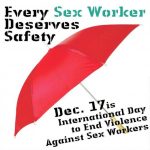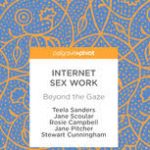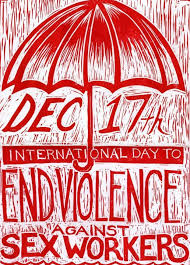
To mark International Day to End Violence Against Sex Workers 2016 Beyond the Gaze team members Dr Rosie Campbell and Professor Teela Sanders, from Department of Criminology, University of Leicester, reflect on change and continuity in patterns of violent and other crimes against sex workers.
As International Day to end Violence against sex workers is marked across the globe on 17th December http://www.december17.org/ we wanted to reflect on the continued high levels of targeted violence and hate crime committed against sex workers and also some of the changing trends in crimes experienced by sex workers as sex work itself changes, as do wider crime patterns. As Beyond the Gaze is focusing on the working conditions, safety and regulation of internet based sex work in the UK the safety and crime issues faced by people working in the online sector are very much on our minds.
Whilst it is important to stress that most commercial sex interactions go without harassment and violence research indicates that sex workers are more at risk from targeted harassment and violence than the general public and many other occupational groups – these risks varying according to sex working sectors, with many studies showing higher levels of violence against street sex workers. A systematic review of research on the correlates of violence against sex workers globally was carried out by Dr Kathleen Deering (University of British Columbia) and a team of researchers. This was published in the American Journal of Public Health in 2014 and they reported that workplace violence over a lifetime was recorded by 45 to 75% of sex workers, with 32% to 55% experienced violence in the last year. http://ajph.aphapublications.org/doi/abs/10.2105/AJPH.2014.301909?journalCode=ajph
We have researched violence against sex workers for some years and argued in an editorial for a special edition of Criminology and Criminal Justice in 2015 that within this global context it is important to unpack the nuances about which groups of sex workers experience violence, at what level and in what forms in order to appropriately develop laws and policies to prevent violence against sex workers . http://eprints.whiterose.ac.uk/87961/3/EditorialSpecialIssueGoverningSexWorkFINAL23June.pdf
In our research we have found that the relationship between sex work and violence is shaped by three key elements which allow for differences in the research evidence on the levels of violence between sectors and across different jurisdictions. Firstly, the environment /spaces in which sex work takes place, this acknowledges the different locational and organisational factors which shape safety across sectors. Secondly, the relationship to the state, that is where a particular form of sex work sits in the regulatory systems, it’s legal status, how and the extent to which it is criminalised and how those laws are enforced. For example, in legal frameworks that criminalise sex work or have quasi criminalisation with some activities associated with sex work criminalised, a difficult context is created where it is hard to gain sex worker confidence and trust in the police. When the police are involved in arresting sex workers, their clients or others who work with sex workers and are also the organisation sex workers must look to for protection and to report crime it is challenging for trust in the police to be achieved. This leads to a number of things including the under-reporting of crimes against sex workers, leaving offenders free to commit further crime and fueling a belief held by some offenders who commit crimes against sex workers that they will get away with their crimes, one of the reasons they target sex workers.
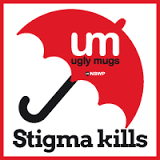
Thirdly, stigma, social status, and the ‘othering’ of sex workers increases hostility and violence. There is a considerable consensus in the global sex work literature that sex workers are stigmatised and this is a central part of the ‘othering’ and objectification of sex workers which researchers have argued contributes to social exclusion, generates hostility and contributes to the denial of full rights and a lack of protection from victimisation. Findings from research show that adopting policing approaches which recognise crimes against sex workers as hate crime contributes to improving criminal justice responses to crimes against sex workers, hence we support such an approach. We support an intersectional approach to hate crime which recognises the varied experiences of hate crime that sex workers have, not only based on experiences of hostility and targeting by offenders because of their sex working but also other aspects of social identity such as race, nationality, gender and sexual identity. For example migrant sex workers may experience targeted crime related to their race or national identity intersected with their sex work status.

One of the reasons for 17th December is to remember those people in sex work who have been murdered. In the UK public imagination when sex worker murder is discussed, people tend to recall the serial murders of street sex workers such as the five women tragically murdered in Ipswich ten years ago, Gemma Adams, Tania Nichol, Anneli Alderton, Annette Nicholls and Paula Clennell. Since those murders in Ipswich 42 sex workers in the UK have been murdered who are recorded on the database maintained by National Ugly Mugs (NUM). A concerning trend in the murder statistics is the increase in the proportion of sex workers murdered who are migrants. If we take the period from October 2013 to the last know sex worker murder in February 2016, 56% of the eighteen people murdered were migrants, compared to 0% of the twenty one people murdered between January 2007 and December 2012. This we argue is not just reflecting an increased proportion of migrant people working in the UK sex industry but also reflects the intersection of targeted anti migrant and sex work hate crime, with such crimes fueled by hostility towards sex workers and migrants and offenders targeting the ‘perceived vulnerability’ of migrant sex workers.
Another distinct trend for the same period October 2013 to February 2016 is that of the eighteen people who were murdered, 56% worked indoor/online, 28% worked on the street. (Please note for 16% how they worked was recorded as not known in the NUM data base). Now compare this to UK sex workers murdered during 2007-2012 21 people were murdered, 71% worked on street, 24% worked indoor/online and 5% street and indoor, indicating an increase in the proportion of indoor/online sex workers who were murdered. Since 17th December 2016 the NUM database records three murders of sex workers in the UK, Daria Pionko in Leeds, Georgina Symonds in Newport and Jessica McGraa in Aberdeen. Jessica and Georgina worked in escorting and Daria on the streets. So the issue of violence against sex workers and other crimes are very relevant for the online sector. Indeed as the online sector is the largest sector of the sex industry in UK it is no surprise that those who target sex workers also target people working in this sector.
This has also been highlighted by findings from a survey of 240 internet based sex workers funded by the Wellcome Trust carried out by our own Prof Teela Sanders in partnership with National Ugly Mugs in 2015. This found that some online sex workers reported crimes similar to sex workers in other sectors, but it also flagged up a number of crimes linked to online and digital technology which had been experienced by internet based sex workers. Some headline findings and recommendations from that research are;
- Levels of concern about crime varied: but 49% were either ‘fairly worried’ or ‘very worried’ about experiencing crime related to their sex work.
- 47% had experienced crime in their sex work – the types of which are shown in the chart below.
- For those working in the online sector new forms of targeted crime were evident. The most common crimes experienced by those people who responded to the survey (86 out of 240) were digitally facilitated which included threatening & harassing texts/calls/emails plus verbal abuse.
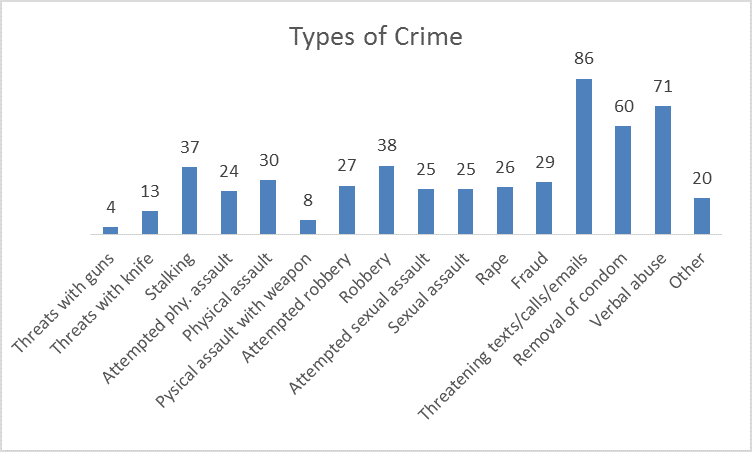
- Sex workers also reported incidents of robbery, rape, physical assault and attempted abduction. Removal of condoms without sex worker consent was the most commonly report non digital crime reported
- Half of respondents (49%) were either ‘unconfident’ or ‘very unconfident’ that the police will take crimes against them seriously
- Safety could be improved through decriminalisation, which would allow sex workers to work together, break down stigma , allow for development of improved trust in police and improved public protection policing for sex workers. The action that could improve safety most identified by sex workers taking part was decriminalisation.
If you want to read more about the research go to a summary https://beyond-the-gaze.com/wp-content/uploads/2015/09/InternetNUMBriefingFINAL2015.pdf or read ‘On our own terms’ published recently in Sociological Research Online http://www.socresonline.org.uk/21/4/15.html
Good news for 2017 the Wellcome Trust are also funding a research project which will compare the experiences of violence and mental health amongst sex workers with other ‘risky’ occupational groups. This will be carried out by Professor Teela Sanders with Dr Lucy Platt and Pippa Greenfell at the London School of Tropical Medicine, working in partnership with NUM.
It was the lack of research data not only on issues of safety for internet based sex workers but about the sector generally, despite it being the largest sector in the UK, that lead Teela with our colleague Prof Jane Scoular at Strathclyde University to apply for the grant from the Economic and Social Research Council which is now supporting Beyond the Gaze.
One element of the larger BTG project is looking at safety and crime issues for internet based sex workers. Sex workers have been sharing their experiences and views about these in research interviews carried out during 2016. These interviews are still being interviewed but the key crimes people are describing include; online email and phone/SMS harassment & abuse, stalking (in person and online) threats to out, outing, doxing (i.e. unauthorised use of information which may be images, profile hacking and private information), computer hacking, none payment by customers, fraud, physical assault, rape and sexual assault.
These findings are set against a back drop were national crime reporting is paying more attention to cyber crime. The Crime Survey for England and Wales, published by the Office for National Statistics for the end of year March 2016 included questions on fraud and computer misuse crime. It estimated that there had been 3.8 million fraud and 2.0 million computer misuse offences experienced in the 12 months prior to interview. A Senior statistician from ONS commented “This is the first time we have published official estimates of fraud and computer misuse from our victimisation survey… Together, these offences are similar in magnitude to the existing headline figures covering all other Crime Survey offences. However, it would be wrong to conclude that actual crime levels have doubled, since the survey previously did not cover these offences. These improvements to the Crime Survey will help to measure the scale of the threat from these crimes, and help shape the response.” John Flatley, Crime Statistics and Analysis, Office for National Statistics. https://www.ons.gov.uk/peoplepopulationandcommunity/crimeandjustice/bulletins/crimeinenglandandwales/yearendingmar2016

Our online sex worker survey has a section on issues of safety and crime, this survey is building on the Wellcome Trust survey carried out by Teela. Our BTG survey is live until 31st January 2017 and it’s really important that we get a large number of sex workers, working in all aspects of internet based sex work, to take part so we have a solid body of data about the online sector, including about experiences of crime and safety, to inform policy and practice. We have the help of many online advertising platforms, sex workers, other individuals and organisations helping us promote the survey – thank you we couldn’t do it without you! So please take 10 mins to complete the survey if you work in the sex industry, whether you’re a web cam model, escort, pro-dom, BDSM specialist, sensual masseur , provider of phone sex we need your help! This link will take you directly to the survey https://leicester.onlinesurveys.ac.uk/btg-sex-worker-survey If you don’t work in the sector but know people who do, please promote the survey.
Next year we’ll be writing up and sharing findings on internet based sex work and safety. We’ll also be working with sex workers, NUM and sex work projects to produce online safety info based on research findings. So we hope Beyond the Gaze will be able to make a significant contribution to improving knowledge about internet based sex work in the UK including matters of safety and crime for people working in the sector. We hope this can help inform the development of effective law and policy for reducing crimes against sex workers and improving safety and working conditions.

The views and opinions expressed in this blog are the those of the authors, they do necessarily reflect the views of the University of Leicester or the University of Strathclyde.



